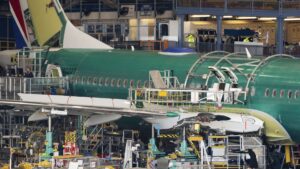Boeing’s Shift in Strategy: Resuming Deliveries to China and Production Ramp-Up
In a significant development within the aerospace sector, Boeing Co. has announced the resumption of airplane deliveries to China, marking a pivotal moment for the aviation giant and its international relations. CEO Kelly Ortberg confirmed that handovers will commence next month after a pause instigated during the tumultuous trade war under the Trump administration.
A New Chapter in U.S.-China Relations
Boeing’s CEO addressed attendees at a Bernstein conference, stating, "China has now indicated… they’re going to take deliveries." This signals a thawing of tensions that previously halted deliveries and emphasizes the importance of China as a key market for Boeing’s sales. With tensions escalating over tariffs between the U.S. and key trading partners, Ortberg is optimistic about the future, assuring stakeholders that he does not anticipate these strains to last long-term.
Boeing, a leading American exporter, plays an essential role in mitigating the U.S. trade deficit through its airplane manufacturing. However, the company has faced its share of tariffs on imported components for its Dreamliner planes, which are primarily assembled in South Carolina. Ortberg noted that while they incurred these additional costs, the ability to recoup them upon export helps soften the financial blow.
Production Goals and FAA Compliance
Moreover, Ortberg emphasized Boeing’s ambition to ramp up production of its popular 737 Max jet this year, contingent on receiving Federal Aviation Administration (FAA) approval. Following last year’s production cap of 38 planes per month—set due to a safety concern after an incident with an Alaska Airlines flight—Boeing eyes a gradual increase. Ortberg confirmed that by mid-year, output could reach 42 Max jets monthly, with an assessment for further increases to 47 jets in the subsequent half of the year.
Adding to the excitement for industry insiders, the long-overdue certification of the Max 7 and Max 10 variants is projected for the end of this year. These models, encompassing both the largest and smallest configurations in the narrow-body family, could reenergize Boeing’s offerings in a post-pandemic market eager for expanded fleets.
Industry Perspective: Optimism Amid Challenges
Boeing’s recent trajectory has garnered praise from industry leaders. United Airlines CEO Scott Kirby recently expressed his confidence in Ortberg’s leadership since assuming the role in August. Kirby noted that while supply chain disruptions continue to impede overall aircraft deliveries, he believes Boeing has successfully navigated recent challenges.
Kirby stated, "I do think Boeing has turned the corner," reflecting a sentiment shared by many in the industry who have faced delivery delays, especially in light of recent surges in air travel demand.
Conclusion: Looking Ahead
As organizational shifts and geopolitical landscapes influence the aviation industry, Boeing’s strategy to resume deliveries and ramp up production underscores a return to focus amidst external challenges. For investors and industry enthusiasts alike, the unfolding developments present an opportunity to observe how Boeing adapts and responds to both market demand and international relations.
At Extreme Investor Network, we remain committed to delivering not just the latest business news but in-depth analysis that offers insights into the implications of these changes on the global economy. Stay tuned for updates and expert commentary on Boeing’s journey back into a crucial market and what it means for the future of aviation.

